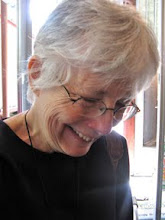The class I attended was advertised as "Uses and Abuses of Sacred Scripture." It was a one-night stand, so to speak, an evening session that included a panel discussion between a Muslim (Arabic scholar) a Rabbi (Sanskrit expert) and a former Jesuit/now Episcopal priest.
I'm not sure what I expected, but at the time the discussion didn't seem to fulfill the theme. Apparently I wasn't the only attendee to feel disoriented; a comment from another classmate echoed the same thought. So what was I expecting? A handbook on how to abuse scripture? Or... a handbook on how to defend myself from individuals who use scripture to abuse me?
What we got was three variations on the theme: Sacred text, whether it be Torah, Gospel or Koran is the Living Word of God. I knew that. Didn't I? Maybe yes and maybe no.
Our Rabbi opened his remarks with the statement "The Bible says." and then went on to refute this all-too-common (I would say fundamentalist) attribution with: "The Bible doesn't say anything." He explained that what we understand the Bible to mean is a far cry from the Bible says. That rings true for me. I've been in too many dead-end arguments with "The Bible says it, I believe it, and that settles it" poster children. There's no where to go in a discussion with people who quote the Bible as the last word. He also pointed out the Bible should be the first word, not the last. In other words, an invitation to dialog... yet we know some folks just can't go there.
Our priest expanded with examples of selective screening... how we pick and choose the words to follow that suit our needs or our fancy. He used the example of Jesus telling the young man to sell everything and give it to the poor (one we sidestep) as opposed to the passage where Jesus tells Nicodemus he must be born again. We latched onto that one like white on rice.
Our Muslim scholar gave us an example from Arabic, which apparently uses no punctuation: woman without her man is nothing He asked us to punctuate it. We came up with two versions: Woman, without her, man is nothing. and Woman, without her man, is nothing. For me, neither variation was satisfactory, since both were bashing one gender or the other. Where was the neutral ground? How could this quotation have meaning that doesn't polarize us?
Now... I'm thinking that was the whole point of the evening. Any interpretation of sacred scripture that polarizes is a misinterpretation. It must have meant something else, either in the context of the culture, in a faulty translation from one language to another, or in our limited human comprehension. The Word of God may very well be inerrant, but our grasp of God will never be complete, our understanding always limited to what we either already know or have been taught.
Good to keep in mind if the dialog is ever to continue...
Subscribe to:
Post Comments (Atom)




2 comments:
At my bible studay group the other night we were considering the Parable of the Sower and we ended up discussing salvation, whether it was a prize we have already attained or whether it's just the beginning of the journey. The use of scripture was obviously prominent but the question kept occuring to me, is this what Mark (in this case) intended to be interpreted from his writing or are we completely off track. I must admit i was terrified by the thought.
How about this? "Woman without: her man is nothing."
Then the question becomes Without what? And why does her lack make her man nothing? Or does it?
I dunno the answer - the question just popped into my head as I read your comments.
I am so happy to have found your blog- thanks for sharing.
Edna
Post a Comment